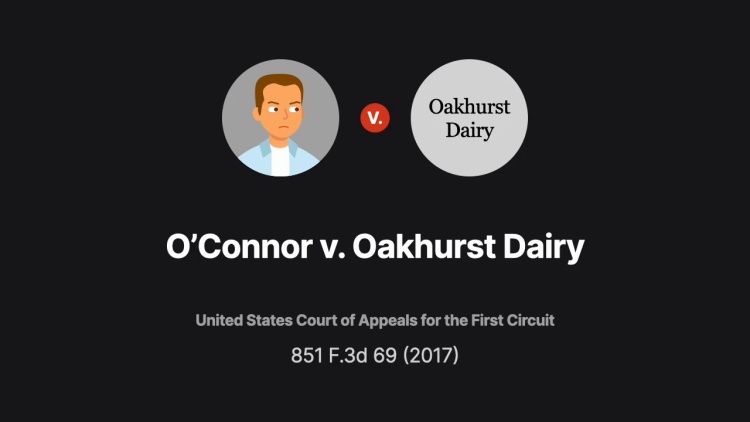O'Connor v. Oakhurst Dairy
United States Court of Appeals for the First Circuit
851 F.3d 69 (2017)
- Written by Liz Nakamura, JD
Facts
Kevin O’Connor (plaintiff) was a delivery driver for Oakhurst Dairy (Oakhurst) (defendant) in Maine. Under Maine’s overtime law, employers were required to pay employees one and a half times their regular hourly rate for any hours worked over 40 hours per week. One exception to the overtime law, Exemption F, stated that employers were not required to pay overtime to employees whose work involved “canning, processing, preserving, freezing, drying, marketing, storing, packing for shipment or distribution of” produce, meat, fish, or dairy products. Oakhurst refused to pay O’Connor overtime, citing Exemption F. O’Connor sued Oakhurst, arguing that the phrase “packing for shipment or distribution” of dairy products in Exemption F did not apply to him because the phrase referred to workers who packed dairy goods for distribution, not to workers like O’Connor who only delivered the packed goods. Additionally, O’Connor argued that his interpretation was supported by the listed-series rule, a linguistic canon stating that every element of a listed series must be a functional match. In other words, O’Connor argued that the phrase “packing for shipment and distribution” must be read as a single activity because all other listed activities in Exemption F preceding that phrase were gerunds, meaning nouns ending in -ing derived from verbs. Oakhurst challenged, arguing that “packing for shipment and distribution” must be read as if it were a serial list separated by a comma preceding the “and” because (1) the Maine Legislative Drafting Manual explicitly prohibited the use of the serial comma, also called the Oxford comma, to separate the last two items in a series, and (2) the only conjunction used in the list separated “packing” from “distribution,” meaning that packing and distribution must be read as separate overtime-exempt activities. The district court granted Oakhurst summary judgment. O’Connor appealed.
Rule of Law
Issue
Holding and Reasoning (Barron, C.J.)
What to do next…
Here's why 907,000 law students have relied on our case briefs:
- Written by law professors and practitioners, not other law students. 47,100 briefs, keyed to 996 casebooks. Top-notch customer support.
- The right amount of information, includes the facts, issues, rule of law, holding and reasoning, and any concurrences and dissents.
- Access in your classes, works on your mobile and tablet. Massive library of related video lessons and high quality multiple-choice questions.
- Easy to use, uniform format for every case brief. Written in plain English, not in legalese. Our briefs summarize and simplify; they don’t just repeat the court’s language.





